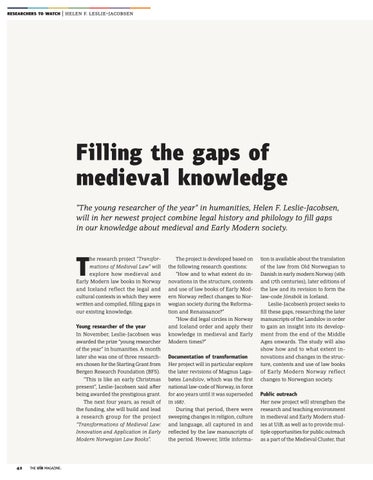researchers to watch | helen f. leslie-jacobsen
Filling the gaps of medieval knowledge "The young researcher of the year" in humanities, Helen F. Leslie-Jacobsen, will in her newest project combine legal history and philology to fill gaps in our knowledge about medieval and Early Modern society.
T
he research project “Transformations of Medieval Law” will explore how medieval and Early Modern law books in Norway and Iceland reflect the legal and cultural contexts in which they were written and compiled, filling gaps in our existing knowledge.
Young researcher of the year In November, Leslie-Jacobsen was awarded the prize “young researcher of the year” in humanities. A month later she was one of three researchers chosen for the Starting Grant from Bergen Research Foundation (BFS). “This is like an early Christmas present”, Leslie-Jacobsen said after being awarded the prestigious grant. The next four years, as result of the funding, she will build and lead a research group for the project “Transformations of Medieval Law: Innovation and Application in Early Modern Norwegian Law Books”.
42
the Uib Magazine.
The project is developed based on the following research questions: "How and to what extent do innovations in the structure, contents and use of law books of Early Modern Norway reflect changes to Norwegian society during the Reformation and Renaissance?" "How did legal circles in Norway and Iceland order and apply their knowledge in medieval and Early Modern times?"
Documentation of transformation Her project will in particular explore the later revisions of Magnus Lagabøtes Landslov, which was the first national law-code of Norway, in force for 400 years until it was superseded in 1687. During that period, there were sweeping changes in religion, culture and language, all captured in and reflected by the law manuscripts of the period. However, little informa-
tion is available about the translation of the law from Old Norwegian to Danish in early modern Norway (16th and 17th centuries), later editions of the law and its revision to form the law-code Jónsbók in Iceland. Leslie-Jacobsen’s project seeks to fill these gaps, researching the later manuscripts of the Landslov in order to gain an insight into its development from the end of the Middle Ages onwards. The study will also show how and to what extent innovations and changes in the structure, contents and use of law books of Early Modern Norway reflect changes to Norwegian society.
Public outreach Her new project will strengthen the research and teaching environment in medieval and Early Modern studies at UiB, as well as to provide multiple opportunities for public outreach as a part of the Medieval Cluster, that
